反义疑问句讲解上课讲义
反义疑问句讲解ppt课件

let
当为〞let us〞时 当为〞let’s〞时
疑问句为“will you〞 前五后四 疑问句为“shall we “ 前四后五
1.Let’s go to park, Shall we ?
前四
后五
2.Let us do homework. Will you ?
前五
后四
回答
不论一定否认,只抓信息点,能否吻合。照实回答
情态动词
像can/will等情态动词,变为否以为can’t/won’t即可
当have 在完成时中或“You had better〞中时,也当情态动词变。 Have/haven’t,had/hadn’t
1.Lily can play football , Can’t she ? 2.Tom will visit China next mouth , Won’t he ? 3.She has been to HongKong , hasn’t she ? 4.You ‘d better lie down and have a rest ,Hadn’t you ? 5.You can’t go out , Can you ?
反义疑问句
Grammar: 反意疑问句
一、定义:
当我们陈说了一个现实,而又不是很 有把握,就可以在陈说句后加一个简 短问句,称为反意疑问句。
例: 1. She is a student, isn’t she? 2. We speak Chinese, don’t we?
反义疑问句最全PPT课件

3.陈述部分由neither… nor, either… or 连接的并列主语 时,疑问部分根据其实际逻辑意义而定。
Neither you nor I am engineer, are we?
4.陈述部分主语是指示代词或不定代词everything, that, nothing, this, 疑问部分主语用it。
(二)陈述部分有表示过去的时间状语,疑问部分的动词 就用一般过去时。(didn’t + 主语) She must have read the novel last week, didn’t she?
b 表示否定推测时,否定式通常不是must not,而是 can’t (cannot) He can’t have been to your home because he doesn't know your address, does he?
6.否定前缀不能视为否定词,其反意疑问句仍用否定形式。 It is impossible, isn’t it? He is not unkind to his classmates, is he?
7.当主句是由so引起的一个句子,而且译为“这么说来” 时,疑问部分的谓语形式(肯定或否定)应与主句保持一 致。 So you have seen the film, have you? So he has not been to Beijing, has he?
b. 带有定语从句,宾语从句的主从复合句,疑问部分谓 语根据主句的谓语而定 He is not the man who gave us a talk, is he? He said he wanted to visit Japan, didn’t he?
c. 上述部分主句是由谓语think, believe, expect, suppose, imagine等引导的宾语从句,疑问部分与宾语 从句相对应构成反意疑问句 I don't think he is bright, is he? We believe she can do it better, can't she?
反义疑问句详细讲解课件(PPT27张)
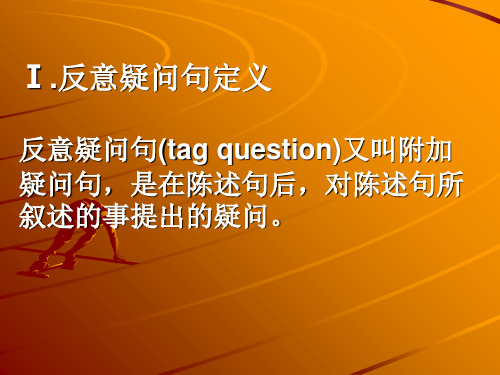
7.当陈述部分的主句是I think (expect, believe)等结构时,反 意疑问句的附加部分则往往与从 句中的主语和谓语动词保持对应 关系,但要注意否定的转移。 例如:
I think he’s funny, isn’t he? I don’t believe she likes my
You must have seen the film last week, didn’t you?
6. 当陈述部分是I am…时,反意疑 问句部分通常要用aren’t I;如陈述 句部分的主语是I am not时,反意疑 问句部分通常要用am I。 例如:
1)I am a teacher, aren’t I?
Ⅰ.反意疑问句定义
反意疑问句(tag question)又叫附加 疑问句,是在陈述句后,对陈述句所 叙述的事提出的疑问。
Ⅱ.基本结构:
陈述句+逗号+简短的一般疑问句?
遵循前肯定后否定前否后肯式的原则
①前肯后否式。例如:
You are all students, aren’t you﹖
②前否后肯式。例如:
Let’s have a rest, shall we? 以let us开头的祈使句,不包括 说话人在内,因此反意疑问句的 附加部分用will you。例如:
Let us stop now, will you?
Ⅳ. 反意疑问句的回答 “ 根据事实回答”
对反意疑问句的回答,无论问题的提法如何,如果 事实是肯定的,就用yes,事实是否定的,就要用no。 要特别注意陈述句部分是否定结构,反意疑问句部分 用肯定式提问时,回答yes或no与汉语正好相反。这 种省略回答的yes要译成“不”,no要译成“是”。
中考英语复习反意疑问句详细讲义及练习
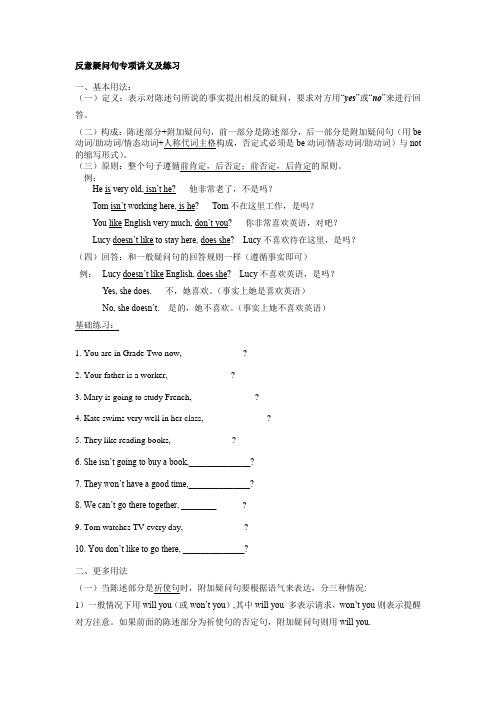
反意疑问句专项讲义及练习一、基本用法:(一)定义:表示对陈述句所说的事实提出相反的疑问,要求对方用“yes”或“no”来进行回答。
(二)构成:陈述部分+附加疑问句,前一部分是陈述部分,后一部分是附加疑问句(用be 动词/助动词/情态动词+人称代词主格构成,否定式必须是be动词/情态动词/助动词)与not 的缩写形式)。
(三)原则:整个句子遵循前肯定,后否定;前否定,后肯定的原则。
例:He is very old, isn’t he? 他非常老了,不是吗?Tom isn’t working here, is he? Tom不在这里工作,是吗?You like English very much, don’t you? 你非常喜欢英语,对吧?Lucy doesn’t like to stay here, does she? Lucy不喜欢待在这里,是吗?(四)回答:和一般疑问句的回答规则一样(遵循事实即可)例:--Lucy doesn’t like English, does she? Lucy不喜欢英语,是吗?--Yes, she does. 不,她喜欢。
(事实上她是喜欢英语)--No, she doesn’t. 是的,她不喜欢。
(事实上她不喜欢英语)基础练习:1. You are in Grade Two now,______________?2. Your father is a worker, ______________?3. Mary is going to study French, ______________?4. Kate swims very well in her class, ______________?5. They like reading books,______________?6. She isn’t going to buy a book,______________?7. They won’t have a good time,______________?8. We can’t go there together, ______________?9. Tom watches TV every day,______________?10. You don’t like to go there, ______________?二、更多用法(一)当陈述部分是祈使句时,附加疑问句要根据语气来表达,分三种情况:1)一般情况下用will you(或won’t you),其中will you 多表示请求,won’t you则表示提醒对方注意。
反义疑问句讲义
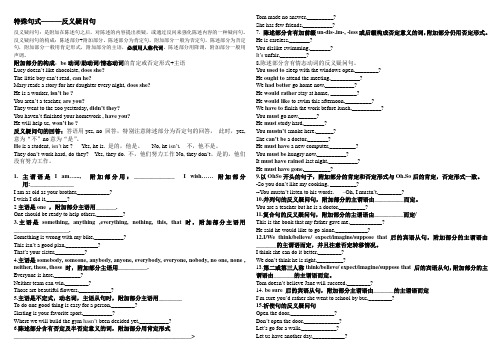
特殊句式———反义疑问句反义疑问句:是附加在陈述句之后,对陈述的内容提出质疑,或通过反问来强化陈述内容的一种疑问句。
反义疑问句的构成:陈述部分+附加部分。
陈述部分为肯定句,附加部分一般为否定句,陈述部分为否定句,附加部分一般用肯定形式,附加部分的主语,必须用人称代词。
陈述部分用降调,附加部分一般用声调。
附加部分的构成:be动词/助动词/情态动词的肯定或否定形式+主语Lucy doesn’t like chocolate, does she?The little boy can’t read, can he?Mary reads a story for her daughter every night, does she?He is a worker, isn’t he ?You aren’t a teacher, are you?They went to the zoo yesterday, didn’t they?You haven’t finished your homework , have you?He will help us, won’t he ?反义疑问句的回答:答语用yes, no 回答,特别注意陈述部分为否定句的回答,此时,yes,意为“不”no意为“是”。
He is a student, isn’t he ? Yes, he is. 是的,他是。
No, he isn’t. 不,他不是。
They don’t work hard, do they? Yes, they do. 不,他们努力工作No, they don’t。
是的,他们没有努力工作。
1.主谓语是I am…..., 附加部分用:______________ I wish……附加部分用:_______________I am as old as your brother,___________?I wish I did it,_______?2主语是one ,附加部分主语用_______.One should be ready to help others,_________?3.主语是something, anything ,everything, nothing, this, that 时,附加部分主语用___________________.Something is wrong with my bike,__________?This isn’t a good plan,___________?That’s your sister,__________?4.主语是somebody, someone, anybody, anyone, everybody, everyone, nobody, no one, none , neither, these, those 时,附加部分主语用__________.Everyone is here,_________?Neither team can win,________?Those are beautiful flowers,___________?5.主语是不定式,动名词,主语从句时,附加部分主语用________To do one good thing is easy for a person,________?Skating is your favorite sport,__________?Where we will build the gym hasn’t been decided yet,__________?6.陈述部分含有否定及半否定意义的词,附加部分用肯定形式_____________________________________________________________> Tom made no answer,_________?She has few friends,__________?7.陈述部分含有加前缀un-dis-.im-, -less或后缀构成否定意义的词,附加部分仍用否定形式。
反义疑问句超详细讲解!!!
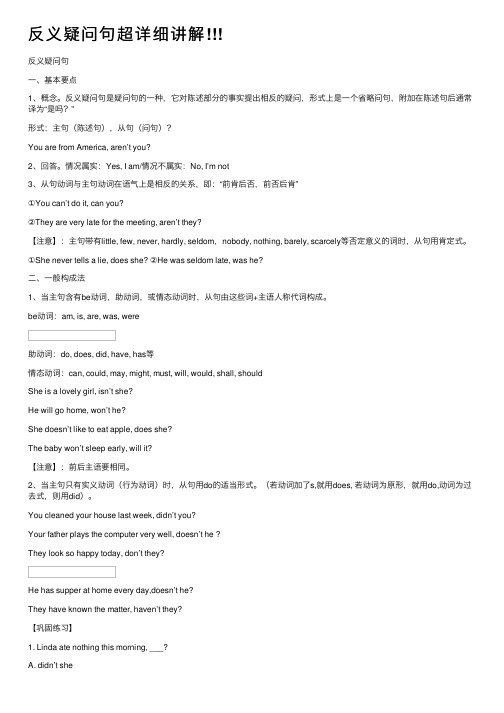
反义疑问句超详细讲解反义疑问句⼀、基本要点1、概念。
反义疑问句是疑问句的⼀种,它对陈述部分的事实提出相反的疑问,形式上是⼀个省略问句,附加在陈述句后通常译为“是吗?”形式:主句(陈述句),从句(问句)?You are from America, aren’t you?2、回答。
情况属实:Yes, I am/情况不属实:No, I’m not3、从句动词与主句动词在语⽓上是相反的关系,即:“前肯后否,前否后肯”①You can’t do it, can you?②They are very late for the meeting, aren’t they?【注意】:主句带有little, few, never, hardly, seldom,nobody, nothing, barely, scarcely等否定意义的词时,从句⽤肯定式。
①She never tells a lie, does she? ②He was seldom late, was he?⼆、⼀般构成法1、当主句含有be动词,助动词,或情态动词时,从句由这些词+主语⼈称代词构成。
be动词:am, is, are, was, were助动词:do, does, did, have, has等情态动词:can, could, may, might, must, will, would, shall, shouldShe is a lovely girl, isn’t she?He will go home, won’t he?She doesn’t like to eat apple, does she?The baby won’t sleep early, will it?【注意】:前后主语要相同。
2、当主句只有实义动词(⾏为动词)时,从句⽤do的适当形式。
(若动词加了s,就⽤does, 若动词为原形,就⽤do,动词为过去式,则⽤did)。
反意疑问句语法讲义
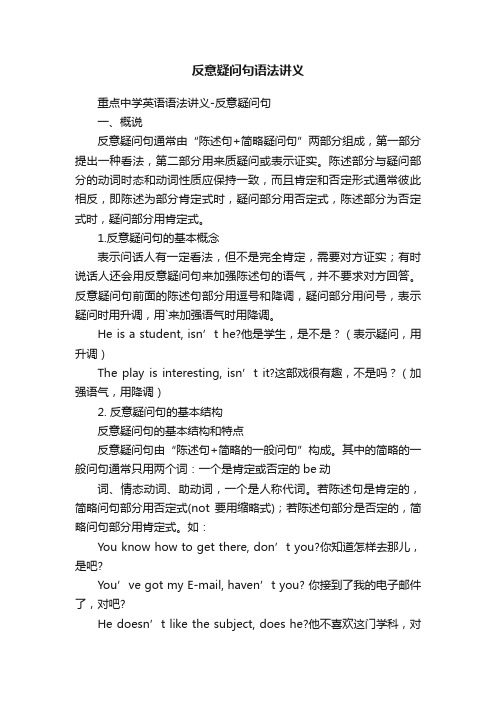
反意疑问句语法讲义重点中学英语语法讲义-反意疑问句一、概说反意疑问句通常由“陈述句+简略疑问句”两部分组成,第一部分提出一种看法,第二部分用来质疑问或表示证实。
陈述部分与疑问部分的动词时态和动词性质应保持一致,而且肯定和否定形式通常彼此相反,即陈述为部分肯定式时,疑问部分用否定式,陈述部分为否定式时,疑问部分用肯定式。
1.反意疑问句的基本概念表示问话人有一定看法,但不是完全肯定,需要对方证实;有时说话人还会用反意疑问句来加强陈述句的语气,并不要求对方回答。
反意疑问句前面的陈述句部分用逗号和降调,疑问部分用问号,表示疑问时用升调,用`来加强语气时用降调。
He is a student, isn’t he?他是学生,是不是?(表示疑问,用升调)The play is interesting, isn’t it?这部戏很有趣,不是吗?(加强语气,用降调)2. 反意疑问句的基本结构反意疑问句的基本结构和特点反意疑问句由“陈述句+简略的一般问句”构成。
其中的简略的一般问句通常只用两个词:一个是肯定或否定的be动词、情态动词、助动词,一个是人称代词。
若陈述句是肯定的,简略问句部分用否定式(not要用缩略式);若陈述句部分是否定的,简略问句部分用肯定式。
如:You know how to get there, don’t you?你知道怎样去那儿,是吧?You’ve got my E-mail, haven’t you? 你接到了我的电子邮件了,对吧?He doesn’t like the subject, does he?他不喜欢这门学科,对吗?Everything is nice, isn’t it?一切都是美好的,不是吗?He has a few friends here, do esn’t he?他在这儿有几个朋友,是吗?He knows a little about it, doesn’t he?他对此事略知一二,是吗?He knows little about it, does he? 他对此事几乎一无所知,是吗?You paid him, didn’t you?你给他付过钱了,对吗?She would like to come, wouldn’t she? 她想来,是吗?You’re coming, aren’t you?你会来的,不是吗?She told you, didn’t s he? 她告诉你了,不是吗?John does n’t like tea, does he? 约翰不爱喝茶,对吗?You can’t swim, can you?你不会游泳,对吗?3. 反意疑问句的回答要用yes或no回答,回答的内容是肯定的就用yes,回答的内容是否定的就用no,这与汉语不完全相同,同学们要特别注意。
中学英语语法讲义:反意疑问句
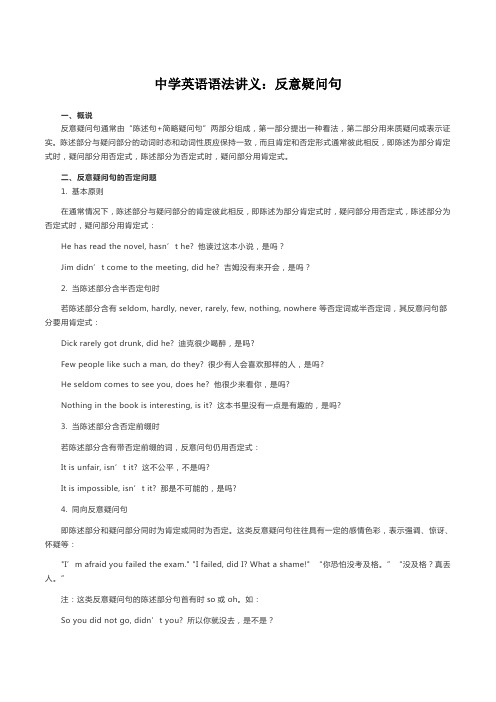
中学英语语法讲义:反意疑问句一、概说反意疑问句通常由“陈述句+简略疑问句”两部分组成,第一部分提出一种看法,第二部分用来质疑问或表示证实。
陈述部分与疑问部分的动词时态和动词性质应保持一致,而且肯定和否定形式通常彼此相反,即陈述为部分肯定式时,疑问部分用否定式,陈述部分为否定式时,疑问部分用肯定式。
二、反意疑问句的否定问题1. 基本原则在通常情况下,陈述部分与疑问部分的肯定彼此相反,即陈述为部分肯定式时,疑问部分用否定式,陈述部分为否定式时,疑问部分用肯定式:He has read the novel, hasn’t he? 他读过这本小说,是吗?Jim didn’t come to the meeting, did he? 吉姆没有来开会,是吗?2. 当陈述部分含半否定句时若陈述部分含有seldom, hardly, never, rarely, few, nothing, nowhere等否定词或半否定词,其反意问句部分要用肯定式:Dick rarely got drunk, did he? 迪克很少喝醉,是吗?Few people like such a man, do they? 很少有人会喜欢那样的人,是吗?He seldom comes to see you, does he? 他很少来看你,是吗?Nothing in the book is interesting, is it? 这本书里没有一点是有趣的,是吗?3. 当陈述部分含否定前缀时若陈述部分含有带否定前缀的词,反意问句仍用否定式:It is unfair, isn’t it? 这不公平,不是吗?It is impossible, isn’t it? 那是不可能的,是吗?4. 同向反意疑问句即陈述部分和疑问部分同时为肯定或同时为否定。
这类反意疑问句往往具有一定的感情色彩,表示强调、惊讶、怀疑等:"I’m afraid you failed the exam." "I failed, did I? What a shame!" “你恐怕没考及格。
- 1、下载文档前请自行甄别文档内容的完整性,平台不提供额外的编辑、内容补充、找答案等附加服务。
- 2、"仅部分预览"的文档,不可在线预览部分如存在完整性等问题,可反馈申请退款(可完整预览的文档不适用该条件!)。
- 3、如文档侵犯您的权益,请联系客服反馈,我们会尽快为您处理(人工客服工作时间:9:00-18:30)。
反意疑问句专题一、基本用法与结构反意疑问句由“陈述句+简略疑问句”两部分组成,第一部分提出一种看法,第二部分用来质疑或表示证实。
陈述部分与疑问部分的动词时态和动词性质应保持一致,而且肯定和否定形式彼此相反,即陈述部分为肯定式时,疑问部分用否定式,陈述部分为否定式时,疑问部分用肯定式:He likes English, doesn’t he? 他喜欢英语,是吗?He doesn’t like English, does he? 他不喜欢英语,是吗?【注】1. 若陈述部分含有no, hardly, never, few, nothing , little, nobody, seldom,等否定词或半否定词,其疑问部分要用肯定式:He has few friends here, has he? 他在这儿几乎没什么朋友,是吗?She said nothing, did she? 她什么也没说,是不是?2. 若陈述部分含有带否定前缀或后缀的词,疑问部分仍用否定式:It is unfair, isn’t it? 这不公平,不是吗?It is impossible, isn’t it? 那是不可能的,是吗?Unnecessary, useless, hopeless, disagree, impolite, unfinished, unequal, misunderstand, antisocial, incorrect, etc.3. 当陈述部分为为there be句型时,疑问部分仍用there作“主语”:There was nothing in the room, was there? 房间里什么也没有,是吗?4. 当陈述部分的主语是指示代词或复合不定代词(this , that, everything, something, nothing, anything, these ,those, someone, everyone, everybody, somebody, no one, nobody)时,疑问部分用it, they等代词:That is a new car, isn’t it? 这是一辆新汽车,是吗?Everything is ready, isn’t it? 一切都准备好了吗?Nobody was late, were they? 没有一个人迟到,是吗?5.当陈述部分的主语是one,其反意疑问句的主语通常用one:One wants to be happy, doesn’t one?二、含情态动词的反意疑问句1. 基本原则:在通常情况下,当陈述部分含有情态动词时,疑问部分会重复前面同样的情态动词:He can speak English, can’t he?他会说英语,是吗?We shouldn’t go, should we? 我们不应该去,对不对?2. 当陈述部分含有must时,要分两种情况:①若must表示“必须”或“有必要”,疑问部分用mustn’t 或needn’t:You must leave at once, mustn’t [needn’t] you? 你必须(有必要)马上离开,是吗?但是若陈述部分有mustn’t表示禁止,疑问部分要must:You mustn’t laugh, must you? 你不准笑,知道吗?②若must表示推测,疑问部分不能用must,而应根据must后的动词结构采用相应的动词形式:He must be tired,isn’t he? 他一定累了,是吗?The ground is wet. It must have rained yesterday, didn’t it?三、陈述部分为祈使句的反意疑问句1. 基本原则:若陈述部分为祈使句,疑问部分通常用will you:Please help us, wil l you? 请帮帮我们,好吗?Come with us, will you? 同我们一起去,好吗?Don’t forget to post the letter, will you? 请别忘了寄信。
2. 当祈使句为Let’s…时,疑问部分总是用shall we:Let’s go there together, shall we? 我们一起去,好吗?3. 当祈使句为Let us…时,若表示请求,疑问部分用will youLet us know your address, will you? 请把你的地址告诉我们,好吗?四、陈述部分为主从复合句的反意疑问句1. 当陈述部分为主从复合句时,疑问部分一般应与主句保持一致:She said that he didn’t like it, didn’t she? 她说他不喜欢它,是不是?He know s where I live, doesn’t he? 他知道我住什么地方,是不是?2. 当陈述部分为I think (believe, suppose, imagine, expect, know, etc ) that...等时,疑问部分通常与从句保持一致(注意否定的转移):I think that it is too short,isn’t it? 我认为它太短了,对不对(它太短吗)?I don’t think he will come, will he? 我认为他不会来,对吗(他会来吗)?【注】这类用法主要限于主语为第一人称think等动词为一般现在时的情形。
陈述句主语为第二人称或第三人称,谓语动词为think (believe, suppose, imagine, expect, know, etc 疑问句部分通常对主句进行反问。
五、几种特殊情况的反意疑问句1. 当陈述部分是I’m…时,疑问部分通常用aren’t I:I’m wrong,aren’t I? 我错了,是吗?I’m older than you, aren’t I? 我年纪比你大,对不对?2. 当陈述部分是I wish…时,疑问部分通常用may II wish to go with them, may I? 我想同他们一起去,可以吗?3. 当陈述部分有had better(I’d better)时,疑问部分用had:He’d better leave here, hadn’t he? 他最好离开这儿,是吗?Would better ,疑问部分would专项练习()1. Don’t forget to give Polly some food and change her water, _______?A. shall weB. will youC. won’t youD. do you ()2. There is little juice in the glass, _________?A. is thereB. isn’t thereC. is itD. isn’t it ()3. ---He’s seldom late for school, ___________?---No. He is used to going to school early.A. isn’t heB. has heC. hasn’t heD. is he()4.---This bus is always late, _________?---Sure, it is.A. is not itB. isn’t itC. isn’t the busD. doesn’t it ()5.---You’re new here, ________?----Yes, I’m from Dujiangyan. I came here last week.A. do youB. don’t youC. are youD. aren’t you ()6. You used to be outgoing, ?A. do youB. don’t youC. didn’t youD. did you ()7. He has never watched such an important match, _____ he?A. hasn'tB. hasC. isD. isn't()8.They have to work at once,______ they?A. haveB. haven'tC. doD. don't()9. She often feels tired,______ she?A. doesn'tB. doesC. isD. isn't()10. Let's take a short rest, ______?A. do weB. aren't weC. will youD. shall we()11. Hundreds of people lost their lives in the accident,_______ they?A. don'tB. didn'tC. doD. did()12. ---Lily didn't come to school, did she?---____. She was ill in bed.A. No, she didB. Yes, she did.C. No, she didn't.D. Yes, she didn't()13.---She isn't a teacher, is she?---_____. She works in a hospital.A. No, she isB. Yes, she is.C. No, she isn't.D. Yes, she isn't()14.Lily looks like Lucy,_______?A. is LilyB. isn't sheC. does LillyD. doesn't she()15.Tom often has lunch at school, _____?A. doesn't TomB. doesn't heC. does TomD. does he提升练习()1.He hardly hurt himself in the accident___________?A. doesn’t heB. didn’t heC. did heD. does he()2. Let’s search the Internet for some information about famous people,______?A. will youB. won’t youC. shall we()3.Eric’s(has) never seen a three-D movie at the cinema,_______?A.hasn’t he B.has he C.isn’t he D.is he()4.---He didn’t go to the lecture this morning, did he?----______though he was not feeling very well.A. No, he didn’t.B. Yes, he did.C. No, he did.D. Yes, he didn’t.()5.—He’s(is) already back to Australia, _________?— _________. He is on a visit to Shanghai.A. isn’t he; NoB. hasn’t he; YesC. isn’t he; YesD. hasn’t he; N ()6.—She doesn’t like geography,does she?— ___________ .A. Yes,she doesB. Yes,she doesn’tC. No,she does()7. He’s(has) flown to Hainan for a holiday, _______ he?A. isn’tB. hasn’tC. wasn’t()8. ---- Let’s go skating,_______?---- OK. Let’s go.A. do youB. don’t youC. will youD. shall we()9. ---There is little milk in the milk bag, ________?---OK. I’ll get you a new bag.A. is thereB. isn’t thereC. aren’t itD. are it ()10. Bob, you watched the fashion show last night, ________?A. weren’t youB. didn’t youC. haven’t youD. won’t you ()11. I don’t think she has gone to Beijing, _______?A. has sheB. hasn’t sheC. do ID. don’t I()12. There is no important information in the newspaper, _______?A. isn’t thereB. is itC. is there()13. There are two libraries in this city, _______?A. aren’t thereB. aren’t theyC. are two()14. Mom, my grandfather goes for a walk after supper every day, _______?A. does heB. is heC. doesn’t heD. isn’t he ()15. Liu Qian has made “magic” a hot word, _______ he?A. doesn’tB. didn’tC. hasn’tD. isn’t()16.---You aren’t a professional athlete, are you?---______. I am just a football fan.A. Yes, I amB. No, I’m notC. Of courseD. Sometimes。
